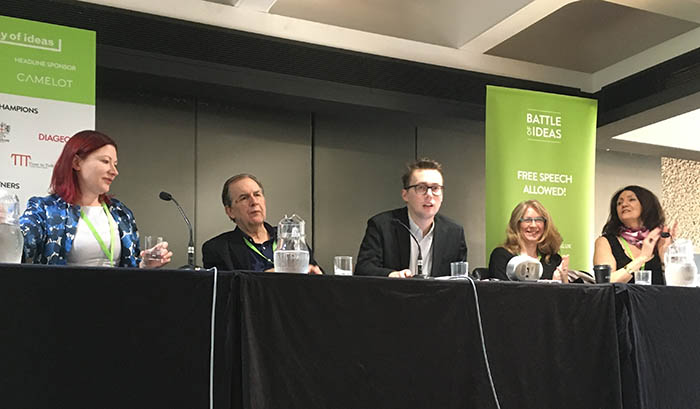[vc_row][vc_column][vc_column_text]

Tiffany Jenkins, David Vincent, Tom Slater, Jodie Ginsberg and Susan Edwards at the Battle of Ideas festival in November 2019. Credit: Michael Gregory
Privacy, especially in the digital age, is less a matter of isolation and more one of of interpersonal relationships. This was the general consensus of panellists at From Domestics to Banter: Is Anything Private Anymore?, a debate at the Battle of Ideas festival on 2 November at the Barbican, London.
The panel, chaired by Spiked deputy editor Tom Slater, included Index on Censorship CEO Jodie Ginsberg: “The question for me is not so much one of privacy; it then becomes a question of trust,” Ginsberg said. “How do we form a contract of trust with those with whom we are communicating?”
“The capacity to understand another on the basis of such limited verbal communication is both a consequence of privacy and a reflection of its value,” said author and historian David Vincent. For that communication to be effective, trust must be established between those involved where privacy is maintained, he added.
For Vincent, one of the first casualties of our eroding privacy is also the most personal — intimacy. He made the case for the preservation of privacy by arguing for the preservation of the private person.
“There is an unevenness in the notion of privacy and freedom,” said University of Buckingham professor Susan Edwards, responding to a concern by panellists around the increasing power of the state and the spurious nature of the claims made by governments that more surveillance is necessary.
Edwards said: “We’ve all said in various ways that particular narratives unlock the power of the state to behave in particular ways.” She added that initiatives launched in the name of protecting the public from terrorism or children from abuse are easy to justify because their stated objectives are so obviously marketable, making them popular with both corporations and states. The scope of their surveillance can then be extended to include those citizens who pose no threat to public safety.
For author Tiffany Jenkins, one of the most worrying trends is what she described as a “collective shrug of the shoulders”. Mass use of CCTV, for example, was introduced in the UK to little resistance.
Edwards was concerned by how despite the charges against Facebook, where British political consulting firm Cambridge Analytica harvested personal data from millions of Facebook profiles without user consent, the platform maintains an enormous user base of some one billion people. So long as the effects of disappearing privacy are not material, people may be keen to ignore it, or disassociate themselves from convoluted government programmes or online data mining operations that do not materially affect their lives, she said.
According to Ginsberg: “We are responsible for that — how we measure what we’re prepared to share and give up for privacy.” She added that “it’s incumbent upon us to be demanding better of institutions that are engaged in, perhaps, trying to breach our privacy”.
Issues surrounding privacy are so pervasive that they touch many aspects of our daily lives, said Ginsberg, and each of us must be vigilant and recognise when our privacy is being violated. By challenging those violations of trust, we can better secure our privacy.[/vc_column_text][/vc_column][/vc_row][vc_row][vc_column][vc_basic_grid post_type=”post” max_items=”4″ element_width=”6″ grid_id=”vc_gid:1573039732017-1b9e3edf-3b64-7″ taxonomies=”269″][/vc_column][/vc_row]




